Homer: The Odyssey
Book XXII
Translated by A. S. Kline © Copyright 2004 All Rights Reserved
This work may be freely reproduced, stored and transmitted, electronically or otherwise, for any non-commercial purpose. Conditions and Exceptions apply.
Contents
- Bk XXII:1-67 The death of Antinous
- Bk XXII:68-115 The battle begins
- Bk XXII:116-159 Melanthius raids the storeroom
- Bk XXII:160-199 Melanthius is captured
- Bk XXII:200-240 Athene intervenes
- Bk XXII:241-309 The fighting continues
- Bk XXII:310-377 Leodes and Phemius
- Bk XXII:378-432 Eurycleia denounces the disloyal women
- Bk XXII:433-501 Telemachus executes the serving-women
BkXXII:1-67 The death of Antinous
Throwing off his rags, resourceful Odysseus sprang to the wide threshold with the bow and the full quiver, poured the arrows out at his feet, and addressed the Suitors: ‘Here is a clear end to the contest. Now I’ll see if I can hit another target no man has as yet, and may Apollo grant my prayer!’
So saying, he aimed a deadly shaft at Antinous, who was handling a fine golden two-handled cup, about to raise it to his lips and sip the wine, his thoughts far from death. How should he guess among the feasting crowd, that one man however powerful he might be could dare to bring a vile death and a dark doom on him? But Odysseus took aim and shot him through the neck. The point passed clean through the tender throat, and Antinous sank to one side, the cup falling at that moment from his hand, while a thick jet of blood gushed from his nostrils. His foot kicked the table away, dashing the food to the floor, and the bread and meat were fouled.
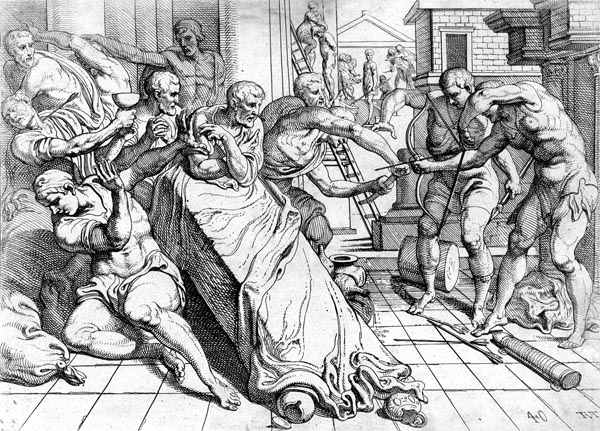
‘Odysseus kills Antinous with his bow’
When the Suitors saw the man fall, there was uproar throughout the hall, and they leapt from their seats in fear, running to the walls to find a shield or a stout spear of which there were no sign. Then they turned on Odysseus angrily: ‘Stranger you’ll pay for choosing a man as your target: no more contests for you, your time is up. You have killed the best of Ithaca’s young men, and now the vultures will have you.’ They imagined in truth that he had killed Antinous by accident, not realising that the net of fate had been thrown over them all. Resourceful Odysseus, glowered at them, and answered: ‘You dogs! You thought I’d never return from the land of Troy, so you laid waste my house, forced my maids, and wooed my wife in secret though I was still alive, without fearing the gods who rule the wide sky, or that mortal vengeance would find you. Now the net of fate is thrown over you all.’
Fear blanched their cheeks at his words, and every man glanced round, looking to escape death’s finality. Only Eurymachus replied, saying: ‘If you are truly Odysseus of Ithaca come home, then what you say of the Achaeans is true – many foolish and wanton things have been done here and in your fields. But now Antinous is dead, and he was to blame for it all: he initiated it, not primarily through desire or need to wed, but with another aim that the son of Cronos thwarted: to be king in Ithaca’s peaceful land. So he lay in wait for your son, to kill him. Now he is dead, as he deserved. Spare your people, then, and we will travel the island and organise recompense for everything we have eaten and drunk in your house, and each of us will make amends to the value of twenty oxen, and repay you with gold and bronze until you are satisfied. Until then, no one could blame you for being angry.’
Resourceful Odysseus glowered, and gave a fierce reply: ‘Eurymachus, even if you Suitors handed over your inheritances, everything you own and whatever might come to you after, even then I’d not keep my hands from slaughter until you’ve all paid the price. Now you can choose to stand and fight or run, if you think a single one of you can cheat death and fate. I don’t think you’ll escape death’s finality.’
BkXXII:68-115 The battle begins
At this, their hearts trembled and their knees shook, but Eurymachus spoke again, saying: ‘Friends, since this man will not restrain his hands, but with the gleaming bow and quiver in his hands intends to fire from the smooth sill till he kills us all, to battle! Draw your swords, and use the tables as shields against his death-dealing arrows. Then let’s rush him together, and try and push him from the threshold, run to the city and raise the alarm: then he’ll have shot his bolt.’
With this he drew his sharp bronze two-edged sword, and sprang at Odysseus with a great cry. But at that very moment noble Odysseus let fly an arrow that struck him in the chest below the nipple, and the swift shaft pierced his liver. Eurymachus let the sword drop from his hand. Sprawling across the table he doubled over and fell, spilling the food and the two-handled wine-cup to the floor. His forehead beat the ground in his last agony, his feet kicked out and rattled the chair, and the mist poured over his eyes.
Amphinomus, now, rushed at glorious Odysseus, attacking him with drawn sword, to force him somehow from the door. But before he could reach him Telemachus quickly threw his bronze-tipped spear, striking him behind between the shoulders, and driving it through his chest. He fell to the ground with a thud, striking his forehead full-on. Telemachus leapt back, leaving the long spear fixed in Amphinomus’ body, fearing that if he stopped to pull the spear free, one of the Achaeans might rush him, and stab him with his sword, or catch him as he stooped over the corpse. So he ran swiftly to his steadfast father’s side, and standing by him spoke with winged words: ‘Father, I’ll bring you a shield, two spears, and a helmet that fits you, arm myself and return with weapons for the swineherd and cowherd there: we would all be better armed.’
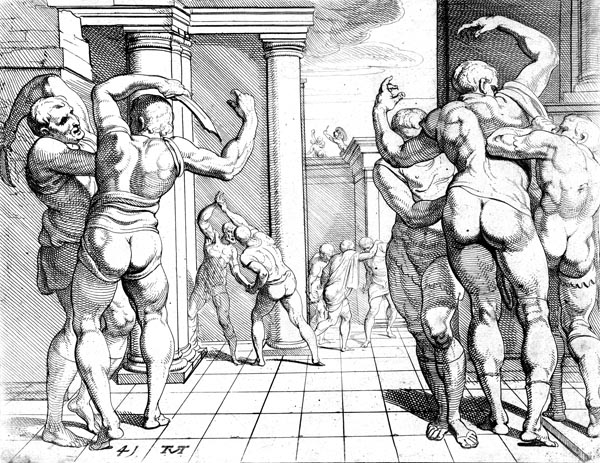
‘Odysseus kills the suitors with the aid of Telemachus’
‘Run’ said resourceful Odysseus, ‘bring them quickly, while I still have arrows left, lest they push me from the door while I’m alone.’
Telemachus obeyed his father, and hurried to the storeroom with its piles of armour. He chose four shields, eight spears, and four bronze helmets with thick horsehair plumes, and brought them swiftly back to his steadfast father. Then he clad his body in bronze, and the two servants likewise donned the fine armour, and stood either side of wise and cunning Odysseus.
BkXXII:116-159 Melanthius raids the storeroom
He, meanwhile, kept shooting steadily at the Suitors, killing them one by one, as long as he had arrows left, till the dead were heaped high,. But when the arrows were gone, he propped the bow by the doorpost of the great hall against the gleaming wall of the entrance. Then he slung a shield, with four layers of hide, across his shoulders, set a strong helmet on his proud head, its horsehair plume nodding menacingly, and picked up two sturdy spears with bronze tips.
Now there was a raised entrance in the solid wall, closed by tight-fitting doors, providing access to a passage at the back of the great hall. Odysseus ordered the worthy swineherd to guard it closely. It allowed space for only one man at a time. Only after he had done so did Agelaus call out loud to the Suitors: ‘Friends, someone must clamber through that door, raise the alarm and alert the people. Then this fellow will soon have fired his last shot.’
But Melanthius the goatherd said: ‘It’s impossible, Agelaus, favourite of Zeus, since the great door into the courtyard is dreadfully near, and the passage is narrow-mouthed. One brave man could stop us all from entering. Let me bring armour from the storeroom though, since I think Odysseus and his fine son have hidden the arms inside not outside.’
With this, Melanthius climbed the steps to Odysseus’ storeroom, and came away with a dozen shields and spears, and as many bronze helmets with thick horsehair plumes and carrying them quickly brought them to the Suitors. Seeing them donning the armour and brandishing long spears in their hands, Odysseus’ heart trembled and his knees shook, and the task ahead seemed huge. He spoke swiftly to Telemachus, with winged words: ‘Telemachus, one of the women servants has stirred up trouble for us, or perhaps it was Melanthius.’
‘Father’ wise Telemachus replied, ‘It is my fault, and no one else’s. I left the door of the storeroom unlocked, and they kept a closer eye than I did. Worthy Eumaeus, go now, and close the storeroom door, and find out whether it is one of the women or Melanthius, Dolius’ son, as I would guess.’
BkXXII:160-199 Melanthius is captured
As they were speaking, Melanthius the goatherd returned to the storeroom to fetch more fine armour. The worthy swineherd spotted him, and immediately told Odysseus nearby: ‘Resourceful Odysseus, scion of Zeus, Laertes’ son, the lethal wretch we suspected is there again, on his way to the storeroom. Should I kill him if I can, or bring him here, so he can pay for all the crimes he’s perpetrated in your house?’
‘Telemachus and I will keep the noble Suitors in the hall,’ resourceful Odysseus replied, ‘however fiercely they fight, while you two tie Melanthius’ arms and legs behind his back, and throw him into the storeroom, then strap him to a board, fasten him to a coil of rope and hoist him up by a roof-beam to the top of a tall pillar, and let him hang there a while in torment.’
They eagerly obeyed, setting off for the storeroom, unknown to Melanthius, who was inside searching for armour in the depths of the room. The two of them lay in wait on either side of the door. When Melanthius, the goatherd, was about to cross the threshold, carrying a fine helmet in one hand, and in the other an old wide mildewed shield – that belonged to Laertes in his heroic youth, but had lain there neglected with the seams of its straps decayed – the two of them sprang at him and seized him. They dragged him inside by the hair, and threw the terrified man to the floor, then tied his hands and feet behind his back with cruel knots, as noble long-suffering Odysseus, Laertes’ son, had told them. Then they fastened a coil of rope to his body and hoisted him up by a roof-beam to the top of a tall pillar. There you, Eumaeus, the swineherd, taunted him, saying: ‘Now you can keep watch all night, lying on the soft bed you deserve, then you won’t miss the coming of golden-throned Dawn, rising from Ocean’s streams, at the hour when you usually drive in the she-goats for the Suitors’ feast in the hall.’
BkXXII:200-240 Athene intervenes
Putting on their armour, they left Melanthius there in his cruel bonds, locked the door and returned to wise and cunning Odysseus. There the four of them stood on the threshold, breathing defiance against the many braves in the hall. It was then that Athene, daughter of Zeus, appeared, with Mentor’s voice and looks. Odysseus saw her, and was glad, and spoke to her saying: ‘Mentor, help fight against disaster: remember me your steadfast friend, one who stood by you, often. You and I were once young together.’
He spoke so, believing it was in truth Athene, the stirrer of armies, while the Suitors for their part shouted abuse, and Agelaus, Damastor’s son, was the leader in rebuking her, saying: ‘Mentor, don’t let Odysseus seduce you with his words to help fight against us. Here is how we would end this business. When we’ve killed this father and son, you will be next to die for your eagerness in action. You’ll pay the price with your life. And when we’ve rendered the five of you powerless, we’ll lump all your possessions, Mentor, together with those of Odysseus, bar your sons from your house, and your good wife and daughters from the streets of Ithaca.’
His speech angered Athene even more deeply, and she exhorted Odysseus with fiery words: ‘Odysseus, your courage is wavering. Where is that brave spirit you displayed when you fought the Trojans for nine long years, all for Helen of the white arms, killing a host of men in cruel conflict, planning the capture of Priam’s city of wide streets? Now when your own house and goods are at stake you tremble at the thought of showing your strength against these Suitors! No, dear friend, come take your stand by my side, and watch how I behave, so you know how Mentor, Alcimus’ son, repays past kindness in the heart of the enemy ranks.’
Yet despite her words she still withheld from him the power to determine the course of the fight, and continued to test the strength and courage of Odysseus and his noble son. She herself now took the form of a swallow, and flew up to perch on the roof beam of the smoke-darkened hall.
BkXXII:241-309 The fighting continues
Now Agelaus, Damastor’s son, Eurynomus and Amphimedon, Demoptolemus, Peisander, Polyctor’s son, and wise Polybus rallied the Suitors, being the best and bravest still alive, and it was their lives they fought for. All the rest had been toppled by the shower of arrows from the bow. Agelaus called out urgently to them: ‘Friends, this man’s invincible grip is weakening now. Mentor has fled after uttering his empty boasts. They are isolated at the threshold. Don’t hurl your long spears together, but let six of you throw first in hopes that Zeus will let Odysseus be hit, and us win glory. The rest won’t matter, once he’s down!’
When he had ceased, the six hurled their sharp spears fiercely, but Athene deflected most of them. One hit the doorpost of the great hall, another lodged in the door, and a third man’s ash spear tipped with solid bronze struck the wall. All four being untouched by the Suitors’ spears, noble long-suffering Odysseus spoke promptly: ‘Comrades, let’s hurl our spears too, at this crowd of Suitors who hope to add to their other crimes by killing us.’
Taking careful aim, they hurled their spears together, on his command. Odysseus struck Demoptolemus; Telemachus killed Euryades; the swineherd hit Elatus; and the cowherd Peisander. All four bit the dust together snapping at the wide earth and the Suitors retreated to the depths of the hall, while Odysseus and the rest leapt forward to retrieve their spears from the corpses.
Once more the Suitors hurled sharp spears fiercely, and Athene again deflected most of them. One hit the doorpost of the great hall, another lodged in the door, and a third man’s ash spear tipped with solid bronze struck the wall. But Amphimedon hit Telemachus a glancing blow on the wrist, and the bronze tip grazed the skin, while Ctesippus’ long spear flew over Eumaeus’ shoulder above his shield, scratching him, then falling to the ground. Then wise and cunning Odysseus gave the word for his comrades to hurl their sharp spears once more into the crowd of Suitors. Odysseus, sacker of cities, struck Eurydamas; Telemachus killed Amphimedon; the swineherd hit Polybus; and lastly the cowherd skewered Ctesippus through the chest, and exulting over his enemy, shouted: ‘You prince of foul abuse, Polytherses’ son, you’ll never speak your foolish boasts again. Leave fine words to the gods, since they are greater than us by far. Take that as a guest gift, a match for the hoof you threw at godlike Odysseus when he begged through the hall!’ So said the herdsman of the spiral horned cattle.
Now Odysseus wounded Agelaus, Damastor’s son, with a thrust of his great spear at close range, while Telemachus hurt Leocritus, Evenor’s son, thrusting his bronze-tipped spear straight through his groin, so that he fell face forward, striking the ground with his forehead. Now from high in the roof Athene held out her fatal aegis, and the Suitors’ minds were filled with panic. They fled through the hall like a herd of cattle goaded and stung by the darting gadflies in spring, when the long days arrive. Odysseus and the others, set upon them, like vultures from the mountains, with crooked talons and curving beaks, swooping on smaller birds that skim the plain beneath the clouds. The birds have no defence or means of escape, and men exult at the chase. So they set about the Suitors, striking left and right through the hall. Hideous groans rose from them, as heads were cleft, and the floor was drenched with blood.
BkXXII:310-377 Leodes and Phemius
But Leodes ran forward and clasped Odysseus’ knees, and begged with winged words: ‘Odysseus, respect the suppliant at your knees: I ask for mercy. I swear I have never wantonly wronged a woman of your house, in word or deed. Instead I tried to restrain others from doing so. But they would not listen, or keep their hands from evil, and so through foolish wantonness they meet a cruel fate. And I, though I am only their innocent priest, will die with them. It is true one gets no thanks for good deeds.’
Resourceful Odysseus gave him an angry look and said: ‘If you were really their priest you must often have prayed that the day of my joyful return would be long delayed and that my loyal wife would go with you and bear you children. For that you will not escape a sorry death.’
With this he grasped the sword in his strong hand that Agelaus had dropped on the ground nearby as he fell, and struck Leodes hard on the neck, so that while he was still trying to speak his head bit the dust.
And now the minstrel, Phemius, Terpius’ son, whom the Suitors forced to sing, tried to flee his dark fate. He stood by the side door, with the clear-voiced lyre in his hands, uncertain whether to slip from the hall, and seat himself by the massive altar of Zeus, God of the Court, where Laertes and Odysseus had burned so many offerings, or whether to run forward and clasp Odysseus round the knees in supplication. He decided the better course was to clasp the knees of Odysseus, Laertes’ son, so he set the pyre on the ground between the mixing-bowl and the silver-embossed chair, and rushing forward gripped Odysseus by the knees, and entreated him in winged words: ‘Odysseus, respect the suppliant at your knees: I ask for mercy. Sorrow will come to you later if you kill a minstrel who sings for gods and men. I am self-taught, and the god has filled my mind with every kind of song. I am worthy of singing for you, as for a god. Don’t be eager to cut my throat. Telemachus, your brave son, is my witness, too, that I never came to sing in your house willingly, but the Suitors dragged me here by force of numbers.’
Royal Telemachus heard his words, and spoke swiftly to his father nearby: ‘Wait, don’t put an innocent to the sword: and we should spare Medon, the herald, too, who used to care for me as a child in this house. Unless that is Philoetius or the swineherd has already killed him, or he has met with you as you raged through the hall.’
Medon, the wise, heard his words where he lay, covered in a newly flayed ox-hide, trying to evade his fate, by cowering beneath a chair. He rose at once and threw off the hide, then dashed forward and clasped Telemachus round the knees, and entreated him with winged words: ‘Here I am, dear boy: stay your hand, and persuade your father to restrain his, lest he wounds me with that sharp bronze in an excess of strength, enraged by the Suitors who ravaged his house and foolishly denied you honour.’
But resourceful Odysseus smiled at him, saying: ‘Be calm! My son has saved you so you might know in your heart, and say to others, how much better it is to do good than evil. Now go outside, and sit in the courtyard away from the killing, you and the versatile singer, till I have done what I must in this house.’
BkXXII:378-432 Eurycleia denounces the disloyal women
At this command, the two of them left the hall, and sat down by the altar of mighty Zeus, glancing from side to side, expecting death any moment. Odysseus too was gazing round the hall to see if any survivors were hiding, trying to escape their dark fate. But he saw that the whole crowd lay covered with blood and dust, like fish, enmeshed in a net the fishermen have dragged from the grey tide, onto the shore of the bay. There they all lie heaped on the sand, gasping for salt water, while the hot sun takes their life. So the Suitors lay there, piled on one another.
Then resourceful Odysseus spoke to his son: ‘Telemachus, call Eurycleia, the nurse, here so I can give her my orders.’ Telemachus quickly obeyed his brave father, and rattling the door, shouted to Eurycleia: ‘Get up, old woman, and come here. You are in charge of the serving-women in this palace. My father has something to say to you. Come, to his call.’
She gave no reply but opened the doors of the great hall at once, and followed Telemachus. She found Odysseus standing among the corpses, spattered with blood and gore, like a lion come from feeding on a farm bullock, his face and chest drenched with blood, a gruesome spectacle. Odysseus was stained like that from head to foot. Yet she, on seeing the pile of bodies weltering in their blood, was ready to shout aloud in exultation at what had been done. Nevertheless Odysseus restrained her eagerness, and spoke to her winged words: ‘Old woman, feel joy in your heart, but control yourself, don’t shout it out. It is impious to rejoice at the sight of dead men. These men were destroyed by the gods and their own wicked deeds, respecting no one on earth, noble or base, who mingled with them. So by their foolish indulgence they brought on their shameful death. Now, though, name me the women in the halls, and say which ones are faithless and which are innocent.’
Then loyal Eurycleia replied: ‘I will tell you it all as it is, my child. You have fifty women serving the palace that we trained to slave away at their duties, and carding the wool. Twelve of them behaved shamelessly, without respect for Penelope or for me. Telemachus is only now a man, and his mother would not let him command the women. But let me run to the shining room above, and carry the news to your wife, whom some god has lulled to sleep.’
But resourceful Odysseus replied: ‘Don’t wake her yet. First, tell the women who behaved shamelessly to come here.’
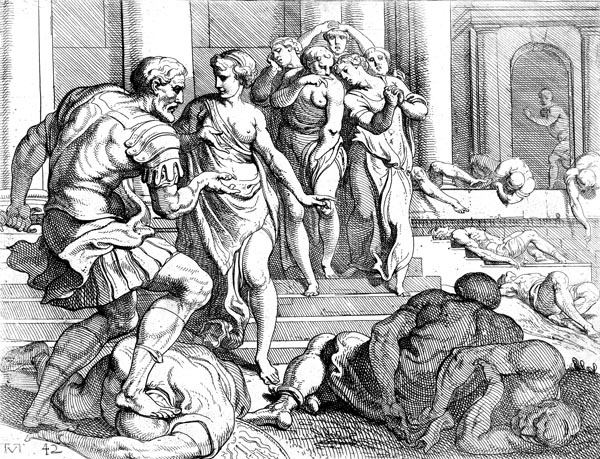
‘Odysseus instructs Eurycleia to gather the unfaithful servants’
BkXXII:433-501 Telemachus executes the serving-women
With this, the old woman went through the hall to tell the women the news and order them to appear, while Odysseus called Telemachus, and the cowherd and swineherd, to him, and spoke with winged words: ‘Begin carrying out the bodies and tell the women to help, then sponge down the tables and good chairs. When the hall is straight, lead the women out of the house to the place between the round house and the solid wall of the court, and let your long sword take their lives, and their memories of the secret delights of Aphrodite among the Suitors.’
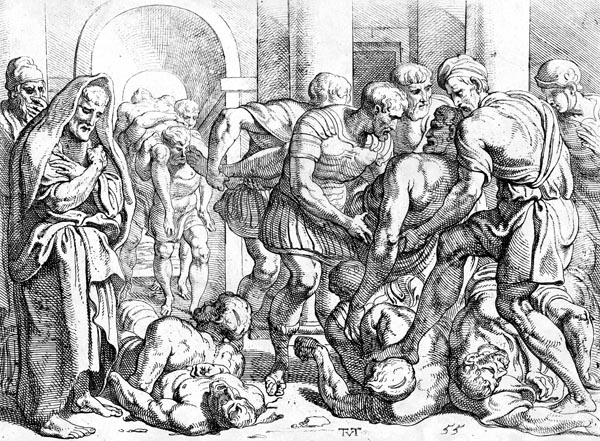
‘The clearance of the suitors' bodies’
He spoke. Then the women flocked in together, weeping and wailing loudly. They carried the corpses out, and set them down under the portico of the walled yard, propping one against another. Odysseus himself commanded them, and urged them on, forcing them to the work. Then they sponged the tables and good chairs clean. Telemachus, and the cowherd and swineherd scraped the floors of the great hall with spades, and the women threw the refuse outdoors. But when they had set the hall in order, they lead the women out of the great hall to the place between the round house and the solid wall of the court, and penned them up in that narrow space from which none could escape. Then wise Telemachus spoke: ‘These women who poured scorn on my mother’s head and mine, while they slept with the Suitors, shall not die cleanly.
So saying, he took a cable from a dark-prowed ship, tied it to a tall pillar, high-up, and noosed it over the round house, so that their feet would not reach the ground. The row of women held up their heads, and the rope was looped round their necks so they might die pitiably, like long-winged thrushes or doves, that are caught in a snare as they try to roost in their thicket, and are welcomed to a grimmer nest. For a little while their feet twitched: but not for long.
Next they dragged Melanthius through the door and into the yard, cut off his nose and ears with the cruel bronze, ripped away his genitals as raw meat for the dogs, and lopped off his hands and feet in their deep anger. Finally, after washing their feet and hands, they returned to Odysseus with the business done.
Odysseus himself spoke to Eurycleia, his faithful nurse: ‘Old woman, bring some sulphur, and make a fire, so I can purge the hall from this pollution. And tell Penelope and her maids to come here, and all the palace women.’
‘My child,’ the loyal nurse replied, ‘all you say is fitting. But let me bring you a tunic and cloak to wear. It would be wrong to stand there in your hall with your broad shoulders clothed in rags.’
Resourceful Odysseus answered: ‘Let me have that fire in the hall first.’ Eurycleia, the loyal nurse, obeyed, and brought sulphur and made a fire. Then Odysseus purged the hall, the yard and the whole palace thoroughly.
The old woman went away then, back through the royal palace, to carry the news to the women and tell them to appear. Out of their hall they ran with torches in their hands. They crowded round Odysseus and embraced him. They clasped his head and shoulders and hands, and kissed them in loving welcome, so that a sweet desire to weep seized him, because he remembered them all in his heart.
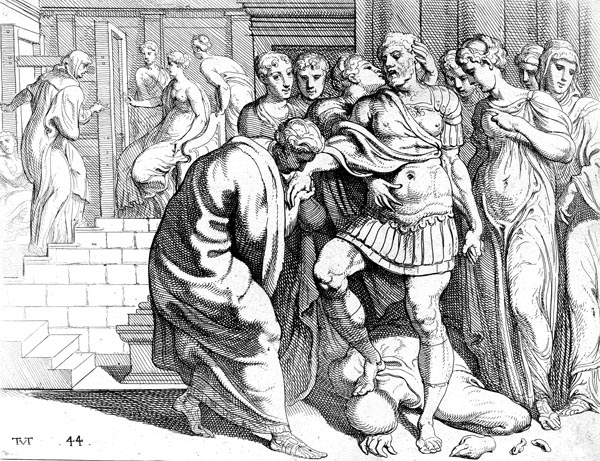
‘Odysseus is welcomed by his servants’